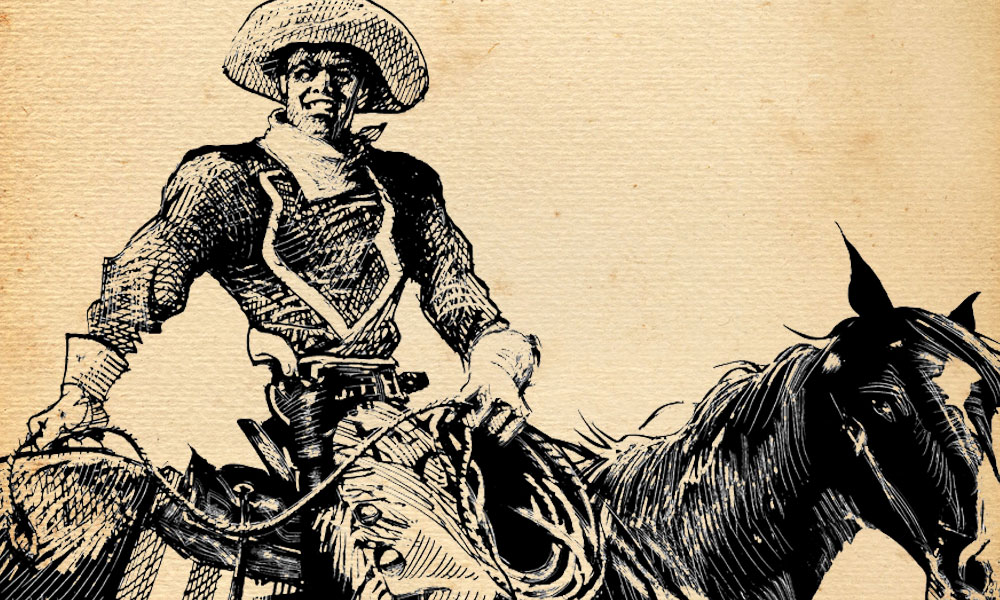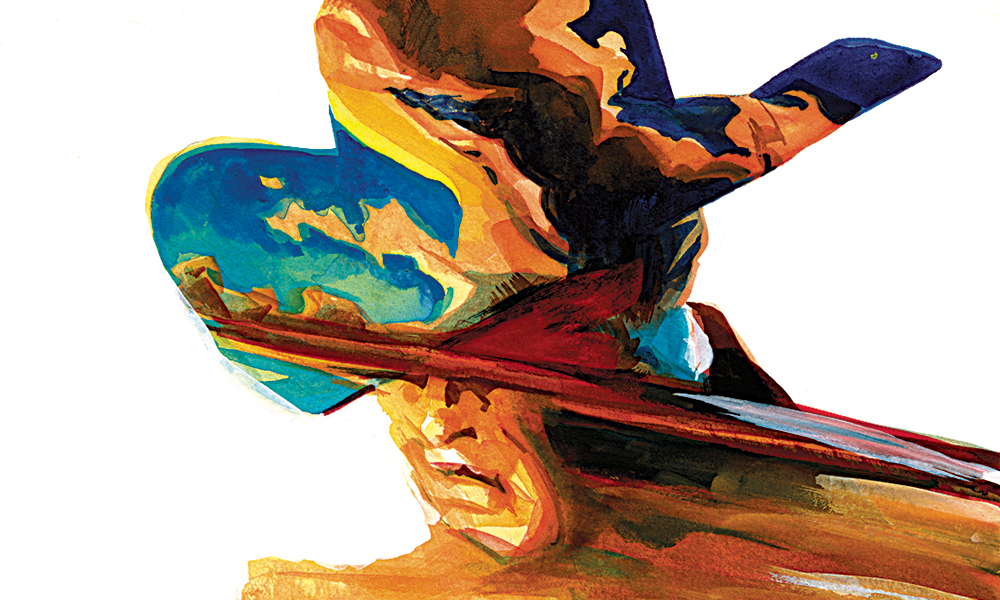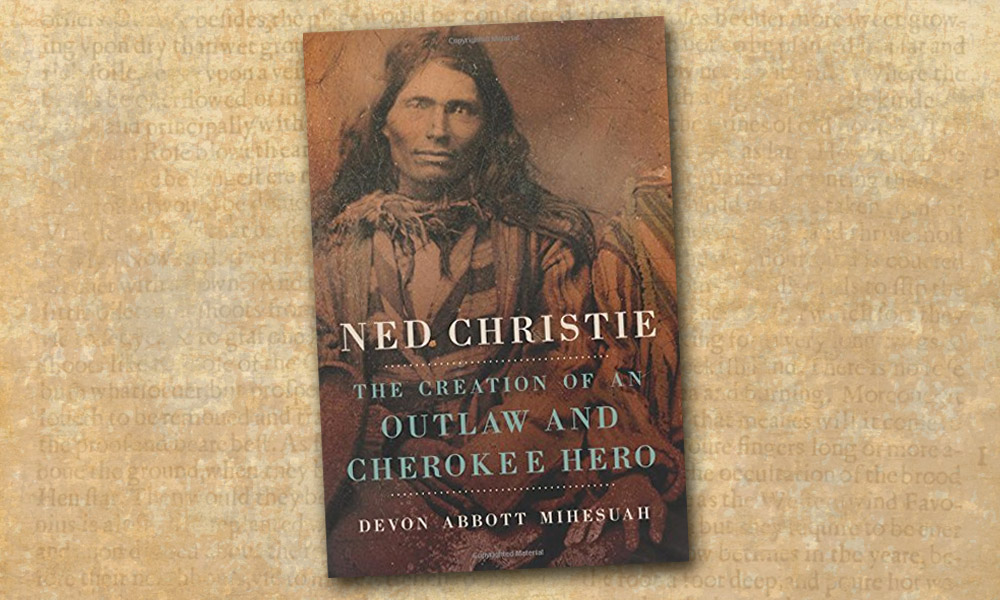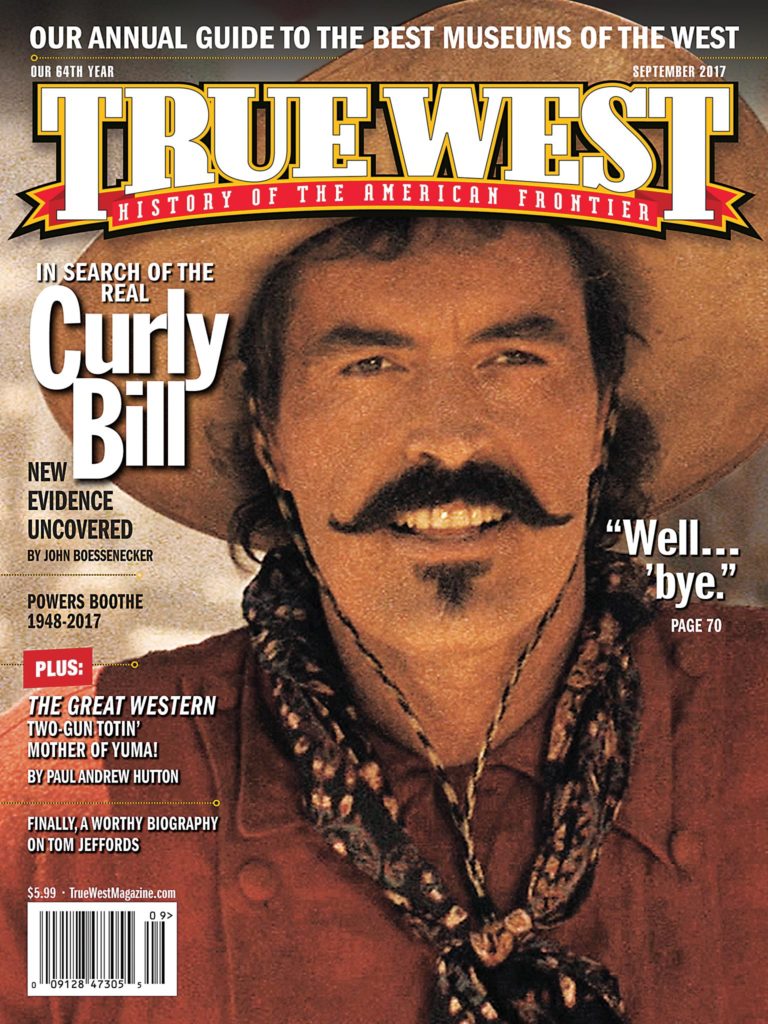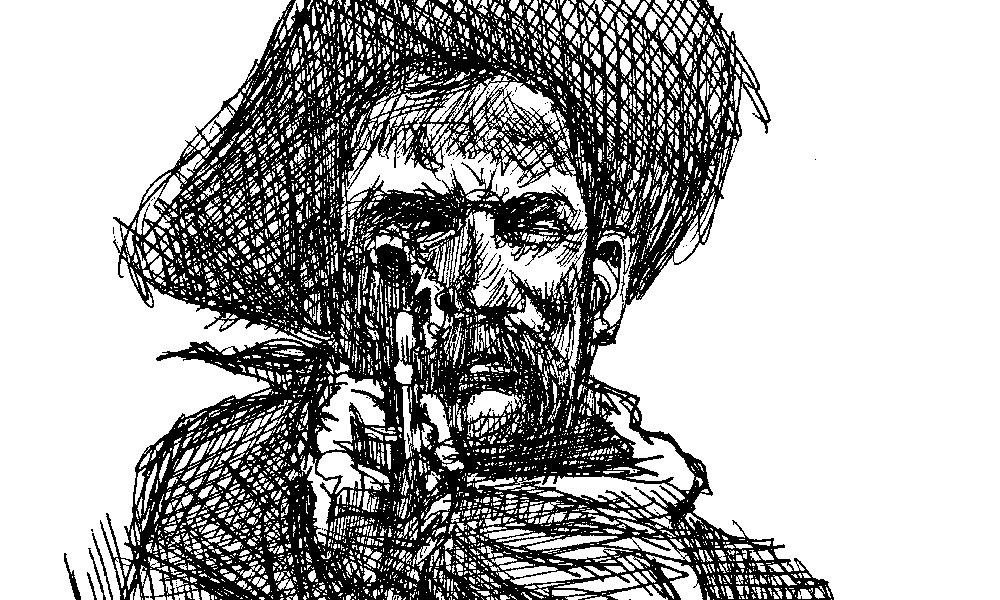
Amazingly, historians know so little about the most famous cow-boy in Cochise County history—“Curly Bill” Brocius. In a journal entry written in October 1881, George Parsons called the man “Arizona’s most famous outlaw.” We don’t know where he came from, when he was born, his real name. Pretty much nada.
One story we do know comes from the celebrated lawman Wyatt Earp. He recommended a lawyer to the cow-boy, who said he could not use James Zabriski because that lawyer had led to his conviction for a robbery in Texas. Further research by Curly Bill biographer Steve Gatto revealed that William “Curly Bill” Bresnaham had been convicted with Robert Martin in 1878 of the robbery; both escaped. Martin became a member of the Jesse Evans gang of outlaws, historian Robert Utley says. And “Curly Bill” may have joined his friend in New Mexico Territory before moving on to Arizona Territory.
Whatever his origin and true identity, the real “Curly Bill” Brocius has been featured in four separate Classic Gunfights published over nearly two decades in True West. Here they are, combined for your reading pleasure.
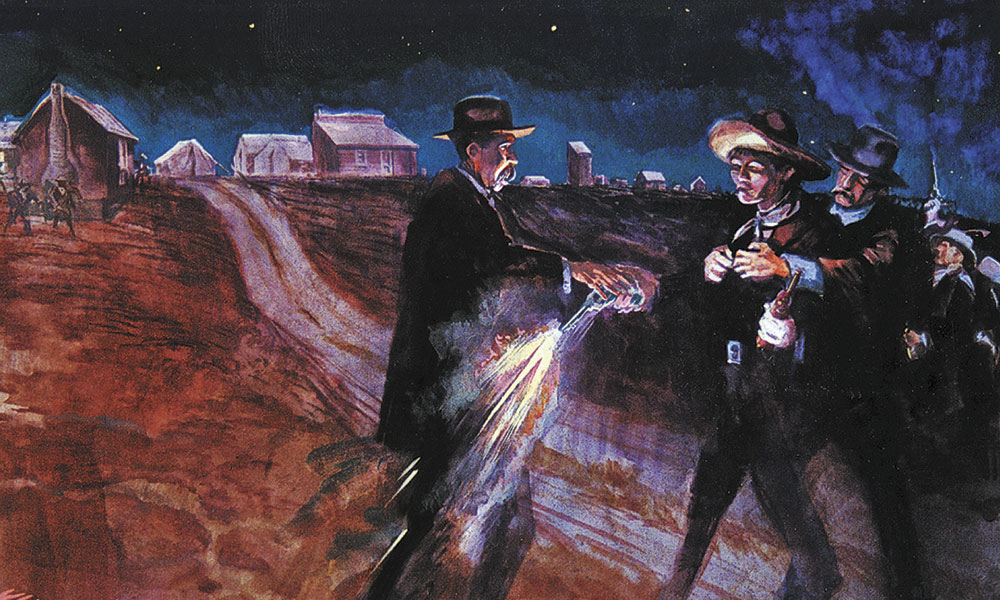
October 28, 1880 “Curly Bill” Brocius vs Marshal Fred White
Fresh off the trail from San Simon, Arizona Territory, where some believe he and his pards treed the town and attempted to hijack a locomotive, Curly Bill Brocius brings his mayhem to Tombstone.
After a “tall bucking” at Brown’s corral, the boisterous cow-boys retire to Allen Street and land in Corrigan’s saloon. The cow-boys are joined by a local, Andrew McCauley, cow-boy Dick Lloyd (the tall bucker), rancher Frank Patterson, Ed Collins, Andrew Ames and a Charleston miner named James Johnson. After several drinks, the party spills out onto Allen Street, with one or more of the men pulling their pistols and firing several shots “at the moon and stars.”
Curly Bill tries to stop the shooting, saying—according to an eyewitness—“this won’t do, boys,” but the men continue their promiscuous fusillade. As locals gather on the street to see what all the shooting is about, three in the cow-boy crowd, including Curly Bill, run behind a building on the south side of the road.
Town Marshal Fred White suddenly appears from around the corner. Several men run up, including Wyatt Earp, just as the marshal says, “I am an officer of the law, give me your pistol.” As Curly Bill reaches to pull out his pistol, Wyatt gets behind Curly Bill and wraps his arms around him to see if he is carrying more weapons.
Grabbing the barrel of Curly Bill’s pistol, Marshal White barks, “Now, you God damned son of a bitch, give up that pistol!” As he tries to jerk the pistol out of the cow-boy’s hand, it goes off.
“I am shot!” says White, as he falls. The muzzle blast sets his pants afire, and someone snuffs the flames.
Wyatt brandishes a borrowed pistol and clubs Curly Bill on the head, knocking him to the ground. “What have I done?” Curly Bill demands. “I have not done anything to be arrested for.”
Wyatt grabs the cow-boy by the collar and marches him over to the small wooden jail, mere feet away from the fracas. Wyatt and his brothers Virgil and Morgan round up the rest of the party, except McCauley, and arrest Collins, Ames, Lloyd, Patterson and Johnson.
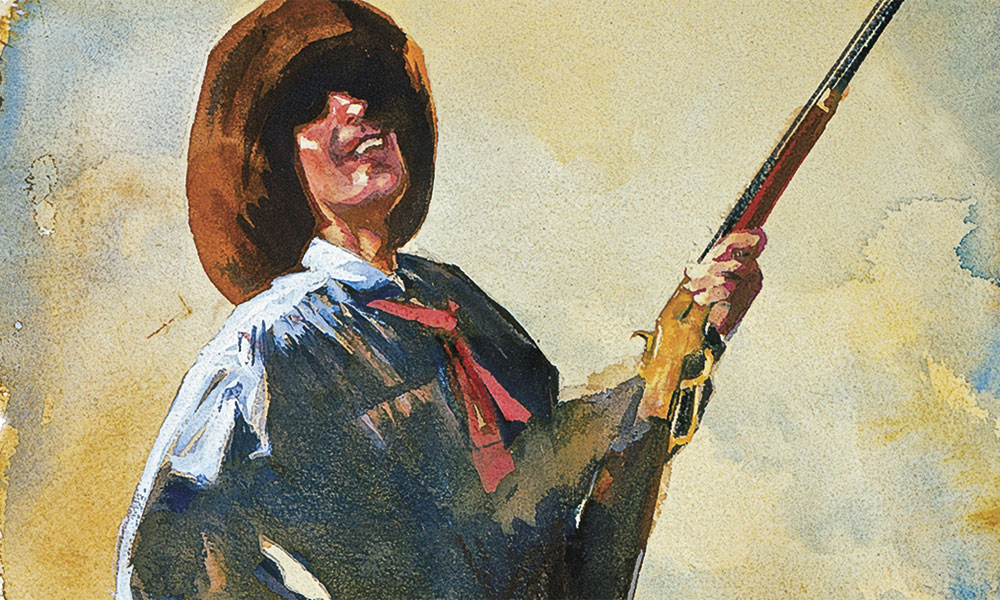
January 9, 1881 “Curly Bill” Brocius vs Everybody on the San Pedro
Fresh out of jail in Tucson, Arizona Territory, “Curly Bill” Brocius leads a group of cow-boys to the San Pedro River, where they head upstream and stop at a church four miles from Charleston.
Dismounting and going inside, Curly Bill, followed by his gang, demands the parson, Joseph McCann, “stop his talk” or Curly Bill “will shoot an eye out.”
“You’re a pious sort of man. I’ve been told, but I want to test it,” says Curly Bill, according to the May 21, 1881, San Francisco Daily Report. “You just naturally think of the Savior while my bazoo [mouth] works, and at the same time pay a little attention to me.” The minister agrees.
“Now stand perfectly still and you won’t get hurt,” Curly Bill says, “Don’t move a peg or this congregation will be without a gospel sharp. Do you take?”
The two cow-boys begin firing, with the shots striking the side wall above and on either side of the pastor’s head, some coming within an inch of his cranium. The minister never flinches, only to lift his head toward the roof for a prayer.
When the gunfire stops, Curly Bill says, “You have given us an evidence of piety which shows that you have chewed the Bible to good advantage.
“I’m damned if I don’t like your style, and if you don’t climb up to the good place, it’s because the seats are already filled. Now step down on the floor, my pious friend, and we will have the doxology.
“Come right down,” says Curly Bill, when the minister hesitates. “It shan’t cost you a cent, and Pete, my Christian friend here, will provide the music.” He points to his pal.
The minister steps to the floor and folds his hands as Curly Bill lays out his next command: “Now dance a jig, and see if you can’t discount Solomon in all his glory.”
The minister finally protests: “I can’t dance. You know not what you ask.”
“Oh, that’s all right,” Curly Bill responds. “Do the best you can. Dance anything, only dance, you must.”
Curly Bill pulls his gun, and the minister begins shuffling his feet, continuing until Curly Bill orders him to stop.
“My friend, your piety is of the right stripe. It pleases me to find that this congregation has such a worthy man to guide its spiritual affairs. Now go right ahead with your gospel chin music and proceed with your bible lessons to the kids.”
Nine days later, the terror from San Simon and his pards invade Contention City, where the cow-boy devils begin to tree the south end of the town.
After abusing everyone they can find, the gang gravitates to the north end, where they go in a store, rob the till of $50 and commit other outrages like “shooting at a peaceable citizen.”
At 8 p.m., several citizens go before the justice of the peace and file complaints against the cow-boys. Warrants are issued. Deputy T.B. Ludwig tries to serve them, but he is run off by Curly Bill and his men, “drawing their Henry rifles.”
Several brave citizens arm themselves and come out on the street to confront the outlaws, but Curly Bill and his men pay them no attention. Eventually, gunfire erupts on both sides, with neither side taking any casualties. After a full day of bedevilment, the cow-boys finally decide to decamp and head up into the hills toward Tombstone.
Curly Bill and his cow-boys don’t quite make it to Tombstone (although Parsons notes in a diary entry that they did), but they stay for two days at nearby Watervale. Allegedly, Curly Bill dares the county authorities to come and get him. The Tombstone Daily Nugget reports seeing “this bravado” wearing “two belts of cartridges, a revolver, and a Henry rifle.”
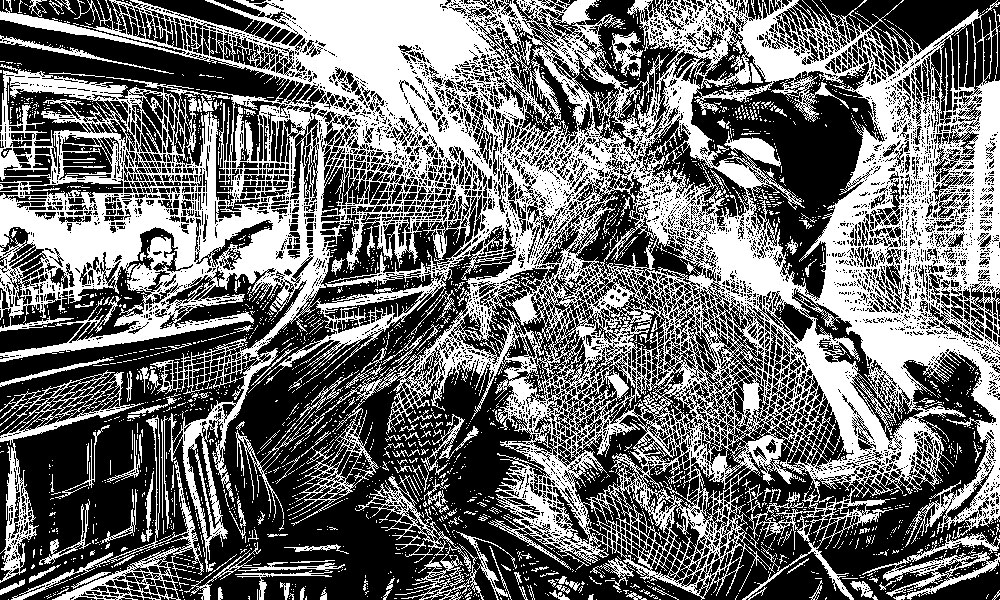
March 8, 1881 “Curly Bill” Brocius, John Ringo and Others vs Dick Lloyd
Rip roarin’ drunk cow-boy Dick Lloyd steps into O’Neil and Franklin’s Saloon in Maxey, where Curly Bill Brocius, Johnny Ringo, Joe Hill and other cow-boys are playing cards. Several of the cow-boys in the card game dislike Lloyd, and he is soon encouraged to leave.
Lloyd makes his way over to Mann’s Saloon, where he drinks with the owner. Known to be quarrelsome when drinking, Lloyd gets into an argument with Ed Mann and ends up shooting him as they stagger into the street.
Running back toward the O’Neil saloon, Lloyd climbs on Joe Hill’s horse and spurs down the main street. As several bystanders watch, disbelieving, Lloyd rides back down the street, shooting and yelling. He rides Hill’s horse right into O’Neil and Franklin’s Saloon. The cow-boys at the card table (and evidently, the bartender as well) unlimber their six-shooters and plug Lloyd, dropping him to the floor of the saloon.
According to legend, the cow-boys then resume their card game and throw excess winnings onto his body to help defray his funeral expenses.
May 19, 1881 “Curly Bill” Brocius vs Jim Wallace
Curly Bill Brocius is holding court in Galeyville, with his cow-boy cohorts. Jim Wallace, a veteran of the Lincoln County War, rides up on a chestnut horse with a white-striped face, dismounts and joins Brocius and friends on the porch of a saloon.
While the cow-boys catch up on the latest news, local constable Goodman comes down the street, notices the horse and asks Wallace where he got it. Insulted, Wallace pulls his pistol and shoots at the ground near Goodman’s heels, saying as he does, “If you want that horse more than I do, take him.”
The lawman quickly leaves in the midst of laughter, and the cow-boys think it is all great sport.
Deputy Sheriff Billy Breakenridge, who is in town to serve attachment on a store that has gone out of business, walks past the saloon when Wallace comes out and confronts him, asking if he, too, is after that horse.
“No,” Breakenridge replies, “I am riding a better horse than that.”
Wallace reaches for his revolver, but Breck (as his friends call him) quickly pulls out his pistol from his waistband and jams it into Wallace’s stomach, and with his other hand grabs the cow-boy’s gun hand, overpowering him.
Rather than arrest him, the deputy returns Wallace’s pistol and exhorts him to stop making a fool of himself. Leaving Wallace behind, Breck enters the saloon and buys a round of drinks for the boys. With things back under control, Breck leaves to finish the inventory at the store.
After hearing what happened on the porch, Curly Bill demands that Wallace bring Breck back to the saloon for a public apology. Humiliated, Wallace does as he is told. Curly Bill is unsatisfied with the apology, however, and threatens to shoot Wallace’s horse.
The cow-boys then take up residence at another saloon, Babcock’s. After more abuse from Curly Bill, Wallace decides it is a good time to leave.
Soon after Wallace’s departure, Curly Bill leaves the saloon. While Curly Bill mounts his horse, Wallace steps forward and shoots at point-blank range. The bullet hits Curly Bill in the neck and passes through his cheek, taking out a tooth as it exits his jaw.
Hearing the gunshot, Curly’s pards quickly come outside and disarm Wallace. Others carry the cow-boy leader to a nearby doctor’s office.
“Billy, someone shot me,” Curly Bill says to Breck, who has heard the shooting and came to investigate. “Who was it?” the outlaw asks.
Breck says he doesn’t know, but he assures Curly Bill he will find out. Walking up the street to Babcock’s corral, the deputy finds Wallace, disarmed and surrounded by cow-boys who want to lynch him.
Breck arrests the young cow-boy without incident and takes him down to the local justice of the peace. The doctor pronounces Curly Bill’s chance of survival as 50/50, to which the outlaw proclaims, “Whenever I get an even chance, I always come out ahead.”
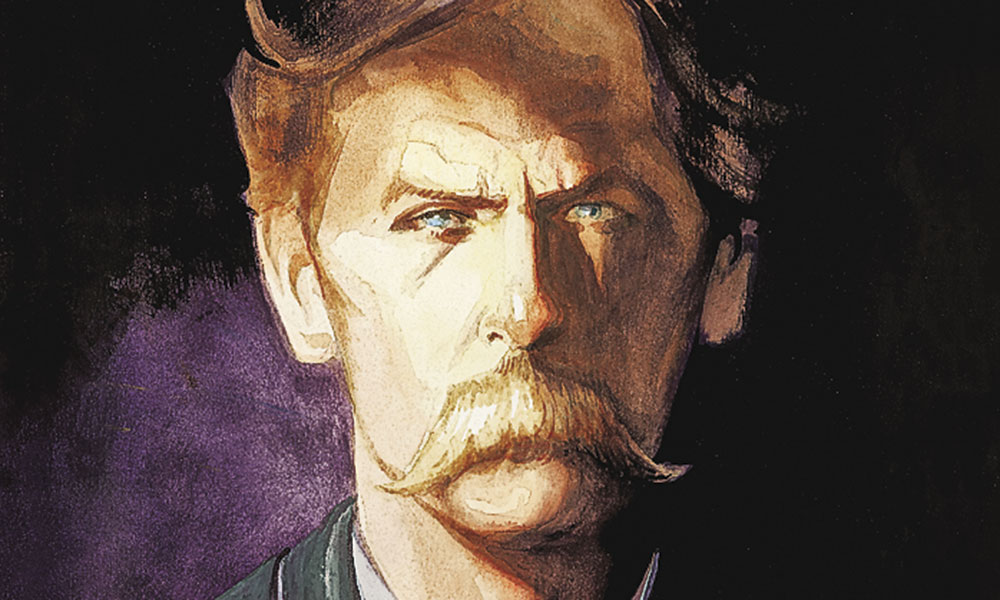
March 24, 1882 “Curly Bill” Brocius vs Wyatt Earp
Wyatt Earp and his men take breakfast north of Contention, Arizona Territory, along the San Pedro River, then ride south toward the Babocomari River to scout out possible hiding places of various criminals.
Leaving his brother Warren on the trail to meet a courier, Wyatt, along with “Doc” Holliday, Sherm McMasters, “Texas Jack” Vermillion and “Turkey Creek Jack” Johnson, ride up a rocky canyon into the Whetstones. Seeing no sign of recent riders, Wyatt loosens the gunbelt around his waist. Horses and men are weary and hot.
The trail they are on is about 100 yards from the waterhole, and it cuts across a deep, sandy shelf. They can see only the tops of the cottonwood trees, as the 15-foot-high bank hides the springs from their view. Across this sandy stretch, Wyatt rides, coat unbuttoned, six-guns sagging low, Winchester in the saddle boot, Wells Fargo shotgun and ammunition belt looped to the saddle horn.
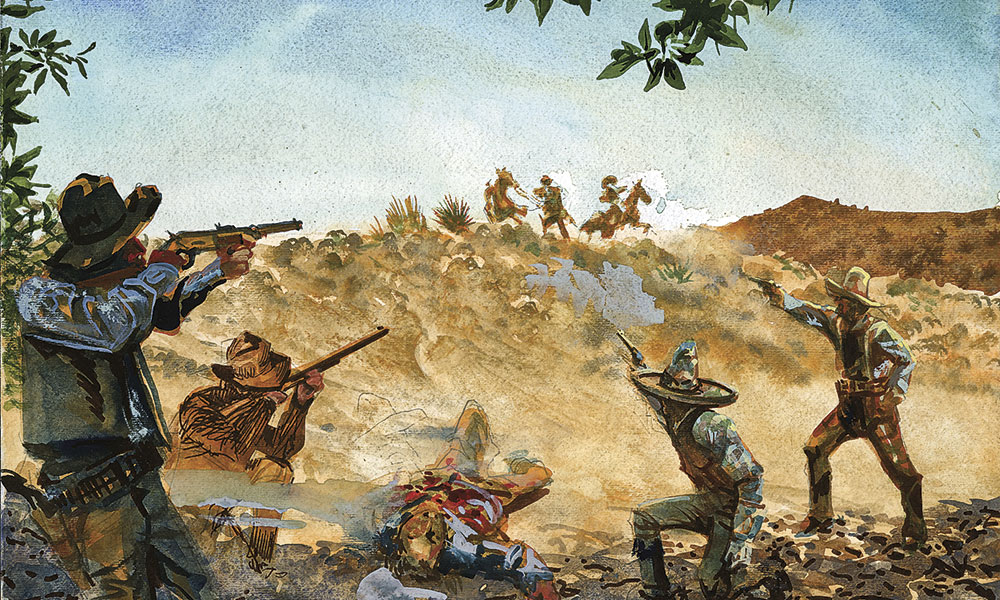
At the scent of water, Wyatt’s horse quickens; Wyatt lets him make his gait. Fifty feet from the spring, intuition brings Wyatt up short. He swings out of the saddle, loops the reins in his left hand with his shotgun in his right hand and walks forward. Texas Jack and Sherm ride behind Wyatt, with Doc and Turkey Creek Jack much farther to the rear. Another step gives Wyatt a full view of the hollow. Two cow-boys jump to their feet, one yanking a sawed-off shotgun to his shoulder, while the other breaks for the cottonwoods.
“Curly Bill!” Sherm yells in astonishment, before wheeling his horse and retreating.
Wyatt later remembers shooting at nine cow-boys who each “had a rifle at his shoulder, and every rifle blazed.”
Aiming at the outlaw chieftain Curly Bill Brocius, Wyatt fires both barrels of his shotgun, fatally striking Curly Bill in the chest, almost cutting him in half.
In spite of his rapid retreat, Sherm is hit in the side, and his binoculars are shot from his neck. Texas Jack’s horse is killed in the volley of cow-boy fire.
Wyatt tries to remount, but his loosened gunbelt has slipped down around his thighs. Bullets tear into his hat, coat and boot heel, and his saddle horn is shot off. He finally succeeds in forking his horse and rides back to a rocky outcropping to rejoin his men. The brief, dramatic fight is over.


